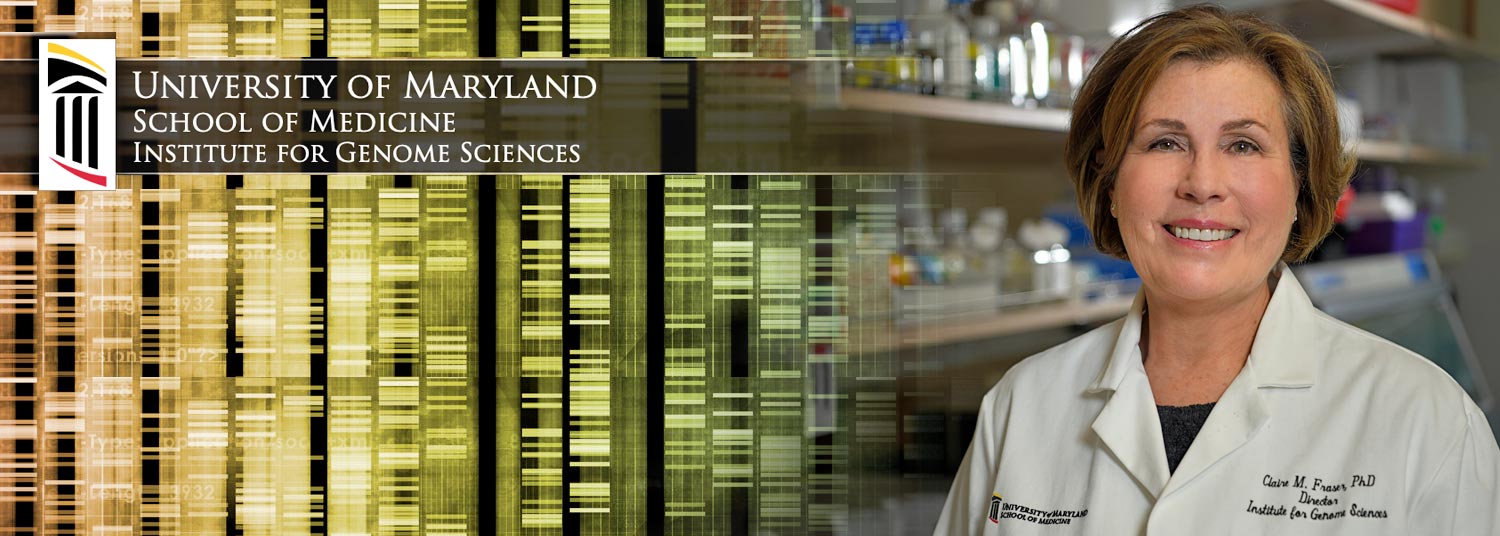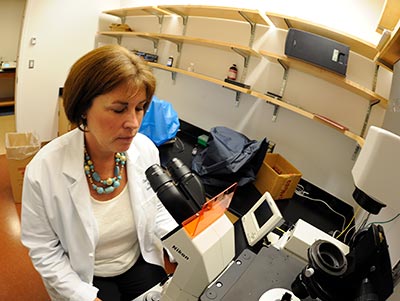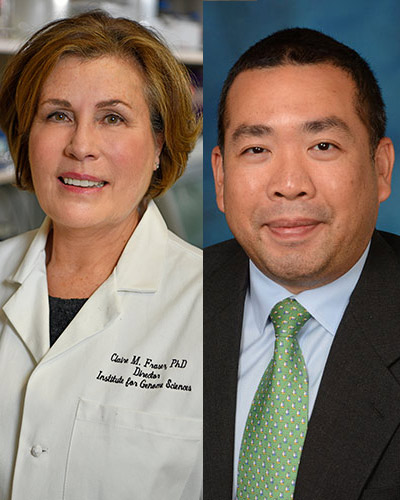March 01, 2023 | Heide Aungst

 Claire Fraser, PhD, a pioneer and global leader in genomic research, has announced that she will step down from her position as Director of the Institute for Genome Sciences (IGS) in the University of Maryland School of Medicine (UMSOM). She will now continue as the Dean E. Albert Reece Endowed Professor and Professor of Medicine and Microbiology and Immunology at UMSOM and scientist at IGS until she retires in 2024.
Claire Fraser, PhD, a pioneer and global leader in genomic research, has announced that she will step down from her position as Director of the Institute for Genome Sciences (IGS) in the University of Maryland School of Medicine (UMSOM). She will now continue as the Dean E. Albert Reece Endowed Professor and Professor of Medicine and Microbiology and Immunology at UMSOM and scientist at IGS until she retires in 2024.
 Jacques Ravel, PhD, Professor of Microbiology and Immunology at UMSOM will continue in his Interim role as Acting Director of IGS.
Jacques Ravel, PhD, Professor of Microbiology and Immunology at UMSOM will continue in his Interim role as Acting Director of IGS.
Dr. Fraser founded IGS in 2007 when she brought 60 researchers and staff with her from The Institute for Genomic Research (TIGR) in Rockville, MD, at the invitation of Dean E. Albert Reece, MD, PhD, MBA. IGS celebrated its 15th anniversary of groundbreaking genomic and microbiome research at UMSOM last October.
Dr. Fraser came to UMSOM as one of the most highly cited investigators in microbiology. At TiGR, In 1995, Dr. Fraser was the first to map the complete genetic code of a free-living organism—Haemophilus influenza—the bacterium that causes lower respiratory tract infections and meningitis in infants and young children.
Her discovery forever changed microbiology and launched a new field of study—microbial genomics. During that time, she and her team also sequenced the bacteria behind syphilis and Lyme disease, and eventually the first plant genome and the first human-pathogenic parasite. She even helped identify the source of a deadly 2001 anthrax attack in one of the biggest investigations conducted by U.S. law enforcement. In 2007, Dr. Fraser launched the Institute for Genome Sciences (IGS) at the University of Maryland, which holds over 25 percent of the funding awarded by the Human Microbiome Project.
Since its inception, IGS has helped revolutionize discoveries in medicine, agriculture, environmental science and biodefense. By applying genomic tools to clinical research, IGS investigators are creating new dynamics for understanding individual differences in our susceptibility to disease, for understanding the role of our bodies' microorganisms in health and disease, and for exploring new personalized therapeutics.
At IGS, Dr. Fraser has led a team that has grown to more than 100 faculty, staff, and students. She has continued her research in the role of the microbiome in health and disease, publishing recently on how a mother’s HIV status, breastfeeding, and the infant microbiome impacts the health of newborns.
 “Dr. Fraser is one of the pre-eminent scientists of our time in a field that is re-defining how we investigate and treat complex diseases,” said Mark Gladwin, MD, Vice President for Medical Affairs, University of Maryland, Baltimore, and the John Z. and Akiko K. Bowers Distinguished Professor, and Dean, University of Maryland School of Medicine. “In addition to her own groundbreaking discoveries in microbial genomics, she has mobilized a team of world-renowned investigators at IGS who are leading the nation in harnessing the power and potential of large-scale genomic research, and exploring new genomic applications in precision medicine, therapeutics, infectious diseases, virology and cancer research. We are forever indebted to Claire for her historic contributions to the UMSOM.”
“Dr. Fraser is one of the pre-eminent scientists of our time in a field that is re-defining how we investigate and treat complex diseases,” said Mark Gladwin, MD, Vice President for Medical Affairs, University of Maryland, Baltimore, and the John Z. and Akiko K. Bowers Distinguished Professor, and Dean, University of Maryland School of Medicine. “In addition to her own groundbreaking discoveries in microbial genomics, she has mobilized a team of world-renowned investigators at IGS who are leading the nation in harnessing the power and potential of large-scale genomic research, and exploring new genomic applications in precision medicine, therapeutics, infectious diseases, virology and cancer research. We are forever indebted to Claire for her historic contributions to the UMSOM.”
Dr. Fraser served as President of the American Association for the Advancement of Science (AAAS) in 2020 and as Chair of the organization’s Board of Directors in 2021. She has published more than 320 scientific articles, edited three books, and served on committees of the National Science Foundation, Department of Energy, and National Institutes of Health. She received her PhD in Pharmacology from the State University of New York-Buffalo.
In retirement, she plans to continue her advocacy work for women in STEM fields, K-12 science education, climate change, and health equity.
For a tribute to Dr. Fraser’s career, watch this video from the IGS 15th Anniversary Celebration.
About the University of Maryland School of Medicine
Now in its third century, the University of Maryland School of Medicine was chartered in 1807 as the first public medical school in the United States. It continues today as one of the fastest growing, top-tier biomedical research enterprises in the world -- with 46 academic departments, centers, institutes, and programs, and a faculty of more than 3,000 physicians, scientists, and allied health professionals, including members of the National Academy of Medicine and the National Academy of Sciences, and a distinguished two-time winner of the Albert E. Lasker Award in Medical Research. With an operating budget of more than $1.3 billion, the School of Medicine works closely in partnership with the University of Maryland Medical Center and Medical System to provide research-intensive, academic, and clinically based care for nearly 2 million patients each year. The School of Medicine has nearly $600 million in extramural funding, with most of its academic departments highly ranked among all medical schools in the nation in research funding. As one of the seven professional schools that make up the University of Maryland, Baltimore campus, the School of Medicine has a total population of nearly 9,000 faculty and staff, including 2,500 students, trainees, residents, and fellows. The combined School of Medicine and Medical System (“University of Maryland Medicine”) has an annual budget of over $6 billion and an economic impact of nearly $20 billion on the state and local community. The School of Medicine, which ranks as the 8th highest among public medical schools in research productivity (according to the Association of American Medical Colleges profile) is an innovator in translational medicine, with 606 active patents and 52 start-up companies. In the latest U.S. News & World Report ranking of the Best Medical Schools, published in 2021, the UM School of Medicine is ranked #9 among the 92 public medical schools in the U.S., and in the top 15 percent (#27) of all 192 public and private U.S. medical schools. The School of Medicine works locally, nationally, and globally, with research and treatment facilities in 36 countries around the world. Visit medschool.umaryland.edu
About the Institute for Genome Sciences
The Institute for Genome Sciences (IGS) at the University of Maryland School of Medicine has revolutionized genomic discoveries in medicine, agriculture, environmental science, and biodefense since its founding in 2007. IGS investigators research areas of genomics and the microbiome to better understand health and disease, including treatments, cures, and prevention. IGS investigators also lead the development of the new field of microbial forensics. IGS is a leading center for major biological initiatives currently underway including the NIH-funded Human Microbiome Project (HMP) and the NIAID-sponsored Genomic Sequencing Center for Infectious Diseases (GSCID). Follow us on Twitter @GenomeScience.
Contact
Heide Aungst
HAungst@som.umaryland.edu
216-970-5773 (cell)
Related stories

Thursday, October 12, 2023
New Research Shows How Brain Inflammation in Children May Cause Neurological Disorders Such as Autism or Schizophrenia
Severe inflammation in early childhood is a clinically known risk factor for developing autism and schizophrenia. Now, for the first time, scientists from the University of Maryland School of Medicine (UMSOM) have discovered that inflammation alters the development of vulnerable brain cells, and this could have mechanistic links to neurodevelopmental disorders. This finding could lead to treatments for many different childhood-onset neurodevelopmental disorders.
.jpg)
Wednesday, May 03, 2023
University of Maryland School of Medicine Genomic Scientist Claire M. Fraser Elected to the National Academy of Sciences
The National Academy of Sciences (NAS) has announced that Claire M. Fraser, PhD, the Dean E. Albert Reece Endowed Professor in the Department of Medicine at the University of Maryland School of Medicine (UMSOM), and the Founding Director of the Institute for Genome Sciences (IGS), has been elected as a new member of the prestigious academy. Dr. Fraser is one of 120 U.S. and 23 international new members elected on May 2, 2023 to the NAS, bringing its total U.S. membership to 2,565 members.

Thursday, April 20, 2023
Researchers Discover Unique Genetic Signature for Mood Disorders in the Old Order Amish
Understanding the root causes of depression, bipolar disorder, and other mental illnesses could lead to new treatments for the 300 million people worldwide who suffer from such conditions.

Friday, January 06, 2023
UM School of Medicine Scientists Create First Extensive Brain Cell Data Repository
Neuroscience researchers now have access to 50 million brain cells to better understand how the brain develops and functions or changes with disease or trauma. Last month, scientists at the University of Maryland School of Medicine’s (UMSOM) Institute for Genome Sciences (IGS) unveiled a “one-stop shop” for brain cell data called the Neuroscience Multi-Omic Archive (NeMO Archive). This archive is now available to neuroscience researchers to transform their understanding of the complex workings of the brain.

Thursday, June 23, 2022
New Research Shows Mothers’ HIV Status, Breastfeeding, and the Infant Gut Microbiome Can Have Long-Term Impact on Infant Health
Babies born to women with HIV often have poorer health and under-developed growth in the early months of life than infants born to women without the infection — even if those babies don’t contract HIV during birth, according to a new study by researchers at the University of Maryland School of Medicine (UMSOM)’s Institute for Genome Sciences (IGS) and Institute of Human Virology (IHV). The study also provides new insights into why these health issues often continue throughout the babies’ lives.
.jpg)
Wednesday, September 15, 2021
Probiotic-Containing Yogurt Protects Against Microbiome Changes That Lead to Antibiotic-Induced Diarrhea, Study Finds
Eating yogurt containing a particular strain of a well-studied probiotic appears to protect against harmful changes in the gut microbiome that are associated with antibiotic administration. That is the finding from a new randomized clinical trial, led by researchers at the University of Maryland School of Maryland (UMSOM), the University of Maryland School of Pharmacy (UMSOP), and Georgetown University Medical Center, which was recently published in the journal Nutrients.

Thursday, March 18, 2021
UM School of Medicine Helps Maryland Conduct State-Wide Sequencing of Variants in Positive COVID-19 Test Specimens
In an effort to monitor the spread of COVID-19 variants in the State of Maryland, University of Maryland School of Medicine (UMSOM) Dean E. Albert Reece, MD, PhD, MBA, announced that UMaryland Genomics at UMSOM will perform genome sequencing of variants in at least 10 percent of COVID-19 test samples, reaching an important benchmark set by the federal government to help control the spread of these variants.

Wednesday, February 10, 2021
UM School of Medicine Researchers Release Extensive Data on Rare Variants through NHLBI TopMed Grant
Researchers at the University of Maryland School of Medicine (UMSOM) and their colleagues published a new analysis today in the journal Nature from genetic sequencing data of more than 53,000 individuals, primarily from minority populations. The early analysis, part of a large-scale program funded by the National Heart, Lung, and Blood Institute, examines one of the largest and most diverse data sets of high-quality whole genome sequencing, which makes up a person’s DNA. It provides new genetic insights into heart, lung, blood, and sleep disorders and how these conditions impact people with diverse racial and ethnic backgrounds, who are often underrepresented in genetic studies.

Thursday, April 04, 2019
UM School of Medicine's Institute for Genome Sciences Awarded $17.5 Million Grant for Infectious Disease Research
The Institute for Genome Sciences (IGS) at the University of Maryland School of Medicine (UMSOM) was awarded $17.5 million from the National Institute of Allergy and Infectious Diseases (NIAID) to fund the IGS Genome Center for Infectious Diseases (GCID) for another five years.

Tuesday, February 12, 2019
UMSOM Scientists Call for Unrestricted Usage of Public Genome Data
Researchers at the Institute for Genome Sciences (IGS) at the University of Maryland School of Medicine (UMSOM) called for open access to genome data, stating that unrestricted usage is needed for progress in combating the world’s most serious diseases.

Tuesday, December 04, 2018
UMSOM/UMSOP Researchers Awarded $1.78 Million Grant to Study Brain-To-Gut Connection in Schizophrenia
Researchers at the University of Maryland School of Medicine’s (UMSOM) Maryland Psychiatric Center (MPRC) and Institute for Genome Sciences (IGS), along with researchers at the University of Maryland School of Pharmacy (UMSOP), have been awarded a collaborative five-year $1.78 million grant to study the brain-to-gut connection in schizophrenia.

Thursday, September 27, 2018
University of Maryland School of Medicine Scientist Receives Prestigious Microbiome Award
Owen White, PhD, professor of epidemiology and public health, and Associate Director for Informatics at the Institute for Genome Sciences (IGS) at the University of Maryland School of Medicine (UMSOM), has received the 2018 Microbiome Pioneer Award. The prestigious honor is part of the Bioinformatics for the Microbiome Symposium organized by Stanford University. The microbiome is the name given collectively to the community of trillions of microbial organisms that live on and within our bodies.

Monday, February 08, 2016
UM SOM Researchers Identify Most Dangerous Strains of Often-Deadly Bacteria
A multi-disciplinary group of researchers at the University of Maryland School of Medicine (UM SOM) have for the first time determined the genetic makeup of various strains of E. coli, which every year kills hundreds of thousands of people around the world.

Thursday, January 21, 2016
UM SOM Board Member and Benefactor Robert E. Fischell, Awarded Presidential Medal
The White House has awarded Robert E. Fischell, ScD, a member of the University of Maryland School of Medicine (UM SOM) Board of Visitors, the National Medal of Technology and Innovation, the highest honor for technological achievement bestowed by the president of the United States. Previous recipients have included such luminaries as Steven Jobs and Stephen Wozniak (Apple Computer, Inc.), Stephen D. Bechtel, Jr. (Bechtel Group, Inc.), David Packard (Hewlett-Packard Company), Clarence L. Johnson (Lockheed Corporation), Edwin H. Land (Polaroid Corporation) and Edith Flanigen (Union Carbide).
